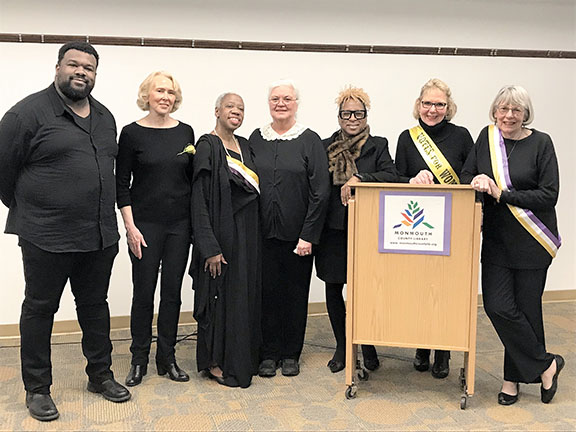
By Gloria Stravelli
RED BANK – Efforts to suppress the votes of Black Americans made headlines during the 2020 election cycle but those efforts are far from new, dating back to the decades-long campaign for women’s suffrage.
Working in collaboration, the T. Thomas Fortune Cultural Center, the American Association of University Women (AAUW) Northern Monmouth County Branch and the League of Women Voters of Monmouth County (LWV) have produced a film, available online, that dramatizes the struggle to secure the right to vote for women – with a focus on the role of Black women.
“Suffragists Speak: Race, Slavery and the Fight for the Vote” dramatizes this complicated history, featuring local residents as historical figures involved in the women’s suffrage struggle. Portrayals include Susan B. Anthony, Frederick Douglass, Ida B. Wells-Barnett, Alice Paul, Carrie Chapman Catt and Fannie Lou Hamer.
The online program will be available 6:30 p.m. Monday, Feb. 28 via Zoom, followed by a discussion. To register, email aauw.nmcb@gmail.com to receive a Zoom link to access the program.
The hour-long video was inspired by the 100th anniversary of the passage of the 19th Amendment, which gave women the right to vote in August 1920. The program was presented two years ago at the Eastern Branch Library to a standing-room-only crowd.
According to Gilda Rogers, executive director of the T. Thomas For tune Cultural Center and one of the actors in the video, plans were to follow up with a program at the center.
“We were supposed to present at the cultural center but by then we were into COVID, so we canceled the in-person program,” she explained.
The group subsequently received grants from the AAUW and the LWV to have the program professionally recorded.

Rogers said the video was inspired by an exhibit created by the Ocean Township Historical Society for the 100th anniversary of the 19th amendment.
“We got together and started fleshing out who we could portray. Fannie Lou (Hamer) was someone I admired,” she said. “Most people are just ordinary people and don’t think they can do extraordinary things, but they can. That’s why I’ve always been drawn to her.”
Hamer, a voting rights activist and co-founder of the Mississippi Freedom Democratic Party, famously addressed the Democratic Convention in 1964. In her speech she described being brutally beaten for attempting to register to vote.
“Having watched her giving that speech… I was angered by it, yet inspired by her determination and courage,” Rogers recalled.
At the time, the broadcast “went into the homes of millions of people,” she said. “The line everybody remembers is, ‘I’m sick and tired of being sick and tired.’ That basically summed up the feeling of so many black people in the country at that time, which wasn’t really that long ago.”
“Her having been subjected to such harsh reality just for trying to vote – that’s what made me angry,” Rogers said, “because it’s been in my lifetime that happened.”
Hamer’s address, alongside the activism of the Rev. Dr. Martin Luther King Jr., Rogers said, led to the Civil Rights Act of 1964 and the Voting Rights Act of 1965.
In addition to Rogers, local actors in the film include Marian Wattenberger portraying Susan B. Anthony, a crusader for women’s suffrage; Antonio Johnson as Frederick Douglass, an abolitionist who helped pave the way for the 19th Amendment to the Constitution giving women the right to vote; Lorraine Stone as Ida B. Wells-Barnett, one of the founders of the National Association for the Advancement of Colored People and prominent journalist; Connie Goddard as Alice Paul, a prominent supporter of women’s suffrage and equal rights; and Anne Torre as Carrie Chapman Catt, head of the National American Woman Suffrage Association and founder of the League of Women Voters in 1920.

“The topic remains important,” said Goddard. “We think this is a way to get at it. We worked on our own part separately and came together every couple of weeks. The program debuted last fall and we decided to promote it for Women’s History Month and Black History Month.”
According to Goddard, the actors began meeting to work on the project in 2019 and wrote their own scripts, timing them at five minutes per character. Costuming is minimal, she noted, with each actor wearing black and “something that sort of speaks to our character.” Goddard wore a hat similar to Paul’s trademark purple one to channel her character.
The video talks about a history a lot of us have not thought about,” she said. “As much as possible we used the actual words of the people we are portraying.”
Goddard said she and Rogers recently presented the program during Civility Week at Brookdale Community College in Lincroft.
“This is still a discussion we are having,” Goddard said, “and we did not realize when we put this together two years ago how relevant it would turn out to be.”
The “Suffragists Speak” program is available free to schools, libraries, community organizations and interested groups. By prior arrangement a live discussion of the film and its present-day implications led by cast members can be included. For more information about “Suffragists Speak” or to arrange a presentation of the program, contact suffragistsspeak@gmail.com.
This article originally appeared in the Fe. 24 to March 2, 2022 print edition of The Two River Times.














